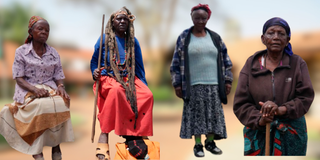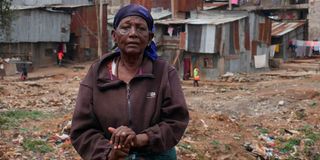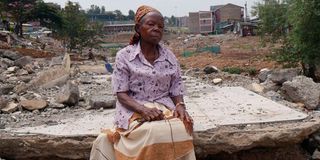Ultimate betrayal: Mau Mau veterans left homeless while flood-risk mansions remain standing

Betrayal of heroes: From left- Beatrice Maina, Gladys Wanjiku, Jane Mwangi and Wanjiru Kiarangu are Mau Mau veterans who supplied weapons to Mau Mau during the freedom fight but now sleep in rubble after their Mathare homes were demolished.
What you need to know:
- Elderly women who fought as Mau Mau freedom fighters against British colonialism now find themselves homeless after government bulldozers demolished their homes in Nairobi's Mathare settlement.
- Affluent neighbourhoods built on the same riparian lands remain untouched.
- Despite surviving torture in colonial detention camps and losing family members in the struggle, these 90-year-old veterans now sleep in the ruins of their homes without the compensation they were promised.
They spilled blood for Kenya's freedom, outlived British bullets, and survived torture in colonial camps. Today, these 90-year-old women - heroes of the Mau Mau rebellion - sleep in the ruins of their demolished homes, betrayed by the very nation they helped birth.
The bulldozers came without warning. For Jane Njeri Mwangi, a 95-year-old veteran of Kenya's independence struggle, they destroyed not just her home of 61 years in Nairobi's Mathare settlement, but also her faith in the country she fought to free.
Njeri together with her 18-year-old granddaughter fled with nothing but the clothes they wore as the machinery bore down on their iron-sheet house.
"They knocked our house down while we were running," she recalls in Kikuyu, her voice trembling as our translator conveys her words. She sits under an open-air wooden shelter by a public field in Mlango Kubwa, Mathare. Since that day, both grandmother and granddaughter have relied on friends for shelter, moving from one temporary refuge to another.
"I was very shocked, coming out of the house. I felt the bulldozer would nearly crush us," Njeri says. When asked about her fears that day, she responds with quiet dignity: "Of course. As a human, you must fear, because your livelihood, your home – everything has been taken away."

Jane Mwangi stands near where her home of 61 years, once stood in Mathare, on January 28, 2025. She says there wasn’t time to save anything during the demolitions.
The cruel irony, Njeri explains, is that her home stood well beyond the 30-metre zone that authorities had marked for demolition - their stated attempt to prevent future flooding in Mathare. Even during the devastating floods that claimed more than 10 lives in Mathare and 200 across Kenya, her modest dwelling remained untouched by the rising waters.
On April 30, 2024, a special Cabinet directive gave residents living on riparian lands - the public strips bordering waterways like the Mathare River - just 48 hours to abandon their homes. The Ministry of Interior and National Administration then slashed this already impossible deadline, ordering anyone within the 30-metre riparian corridor to leave within 24 hours.
"Nothing was saved," Njeri says, her words heavy with the weight of lost memories.
This cruel displacement wasn't the future Njeri imagined when she made Mathare her home in 1963. She built her house across from the Mathari Mental Hospital, Kenya's primary psychiatric facility. The hospital itself tells another story of colonial legacy - once known as the Nairobi Lunatic Asylum, its presence has long stigmatised the surrounding community. For Njeri, who came to Mathare as a Mau Mau fighter, this latest betrayal cuts especially deep.
"We fought for the love of the country and for land," she says simply, her words echoing with six decades of unfulfilled promises.
Njeri's story mirrors that of roughly 50 women in Mathare with ties to the Mau Mau rebellion, all displaced by what government officials euphemistically termed a "mandatory evacuation for their safety" in May 2024. Thirty of these women, like Njeri, fought directly in the anti-colonial resistance; the others are wives, sisters and daughters of Mau Mau fighters.
Today, they stand united in demanding compensation and relocation for themselves and their fellow displaced Mathare residents.
Working with the Mathare Social Justice Centre, a grassroots community organisation, these women are petitioning both the Kenya National Commission on Human Rights and the Ministry of Lands and Housing for justice.
Their fight gained legal backing in October 2024, when the Environment and Land Court declared the demolitions illegal and unconstitutional. The ruling ordered compensation for residents of Nairobi's Mathare, Gwa Kairu, Mukuru Kwa Ruben and Kiamaiko neighbourhoods, with the final amount to be determined by April 2025.
Tellingly, the successful petition highlighted the government's discriminatory approach: while bulldozers razed homes in low-income areas, they spared affluent neighbourhoods like Karen, Gigiri, Runda and Syokimau, despite these areas facing identical flood risks. No eviction notices appeared in these wealthy enclaves.
A spot-check by Nation.Africa exposed stark inequalities in how the eviction orders were enforced. While scrutinising various riverside locations across Nairobi, reporters found houses perched directly above the Kibarange River in upmarket Parklands remained untouched. Similarly, factories along the Ngong’ River continued operating behind their perimeter walls, which encroached on riparian land. Meanwhile, in Soweto, authorities cleared homes as far as 200 metres from the riverbank - far beyond the stated 30-metre zone.
In her scathing High Court judgment, Justice Jacqueline Mogeni condemned the government's actions. "It is inconceivable that 24-hour notice would be sufficient time" to enable them to upheave their lives, she wrote. The ruling highlighted the government's long-standing awareness of these settlements, making their brutal approach even more egregious. Rather than implementing a humane relocation plan, authorities "chose to treat them like 'garbage' and mow them literally out of their houses in the most inhumane manner."
Months after their displacement, Njeri and her fellow survivors remain empty-handed. President Ruto's May promise of Sh10,000 in emergency housing assistance for each of the 40,000 affected households, has failed to materialise. Similarly hollow rings his September 2024, pledge in Kibra to provide 40,000 units of affordable housing for flood victims.
"The first president of Kenya acknowledged the Mau Mau in Mathare," says 85-year-old Wanjiru Kiarangu, her voice carrying decades of betrayal. Like Njeri, she too fought in the Mau Mau rebellion. "Jomo Kenyatta knew the Mau Mau headquarters was in Mathare during the war, so he allocated Mathare to the Mau Maus."

A tractor parked in the area by the Mathare River where the government cleared of homes in May, 2024. A High Court ruling found residents were not given adequate notice of the demolitions.
Yet history tells a more complex tale. Historians note Kenyatta's relationship with the Mau Mau was fraught with contradictions. In the early 1960s, he infamously dismissed the movement as "a disease which had been eradicated, and must never be remembered again." Under his leadership, and that of his successors, the Mau Mau remained outlawed until 2003. Despite promising in 1964 to return land seized during the colonial emergency, Kenyatta notably hesitated to grant property rights to former freedom fighters.
A poignant story, documented by academics in the 1970s, survives in Mathare's oral tradition. When elderly Mau Mau veterans - all women - begged Kenyatta to spare their community from demolition in the 1960s, he reportedly responded in Kikuyu with a proverb: "He who fought the bees gets to keep the honey." The demolitions were halted.
"He said that nobody will ever come and chase us away from this land. It's ours because we bled for it," says Wanjiru in Kikuyu, speaking through a translator - she never had the chance to attend school or learn Swahili. Her words trigger soft applause from the displaced women gathered around her, each carrying their own memories of struggle and survival.
Even before the floods and evictions struck, these women had been mobilising. United by their shared history, they formed a cultural group, performing traditional dances to commemorate the Mau Mau struggle. At protests and community events, they would appear in full Kikuyu regalia, their presence a living testament to Kenya's fight for freedom.

Wanjiru Kiarangu stands amongst the riparian land demotion corridor in Mathare on January 28, 2025. She walks with a cane and has never been able to see properly since she was tortured by colonial authorities during the Mau Mau rebellion.
Cataracts cloud Wanjiru's brown eyes, creeping across her iris - a lasting reminder of British torture during colonial rule. As she recalls her teenage years, her voice grows soft. She was "tortured so much by the British." As a teenager, "less than 16 years old," she brought weapons and supplies to Mau Mau fighters in the forest, often serving as a lookout "as women looked less harmful."
Asked about the Kenya she fought for versus the one she sees today, Wanjiru offers a bittersweet reflection. While she celebrates black self-governance, she adds pointedly, "the invader never left." Those who govern Kenya are still cruel, she says, we are not happy with what's happening now.
"We were not given our freedom. We fought for it, we removed our blood for that freedom, but the freedom, we don't see it," says Wanjiru whose body bears witness to her struggle.
She leans heavily on a wooden cane, and when she lifts her kanga, decades-old scars map the violence on her right leg. British authorities beat her; broke her leg and ribs during the emergency, she says. "It still hurts," she says quietly. "It is the mercy of the Lord I am alive."
A long history in Mathare
For seven decades, Mathare has been Wanjiru's home. She raised eight children and 16 grandchildren there, their homes standing side by side until the floods swept everything away. Her voice catches as she describes what was lost.
"It may have been informal housing," she says, "but it was a good house," it had good irons and a cemented floor. "We can't replace everything that we lost. We're now very poor and very hungry," she adds. "We have nowhere to go. We sleep outside. We can't leave from here; we'd rather die here."
These women, survivors of Kenya's fight for independence, are making one final plea to their government. "Because we are the freedom fighters and the Indigenous people of Mathare," Wanjiru notes.
Their connection to this place runs deep. During the rebellion, Mathare became a stronghold of anti-colonial resistance, drawing fighters from across the region.
Today, 'Mau Mau Road' cuts through the settlement - a testament to this proud history that stands in stark contrast to their current predicament.
"I'm a child of the concentration camp," Wanjiru declares, her words opening a dark chapter of Kenya's history. She speaks of the vast network of over 100 detention centres established by the British during the emergency period. Under the cynical guise of 're-education' and 'rehabilitation', official records acknowledge 80,000 Kenyans were detained without trial. However, historians suggest a far grimmer reality - estimates range from 150,000 to 320,000 detainees, with some arguing the figure could reach 1.5 million if including Kikuyu villages that were effectively turned into prison camps, surrounded by barbed wire, trenches and constant patrols.
In 2013, after an out-of-court settlement, the British government compensated just over 5,000 former Mau Mau fighters. Their foreign secretary finally acknowledged before Parliament what survivors had known all along: "The British Government recognises that Kenyans were subject to torture and other forms of ill-treatment at the hands of the colonial administration."
A history of forced displacement
"We were taken from the highlands region and brought to a concentration camp, where we were forced to work," Wanjiru recalls. "They forced us to work, but my parents ran away from the camp with me to join the Land and Freedom Army."
Today, she says, she wouldn't recognise her ancestral lands even if she saw them.
"I don't have a memory of the other people. I only have the memory of the freedom fighters and the family I created after the war," she adds.
Beatrice Njeri Maina, 74, shares a similar history of childhood resistance. Like Wanjiru, she was sent to a concentration camp but found ways to aid the rebellion despite her tender age.

Beatrice Maina sits on the foundation of a demolished home in Mathare during the interview on January 28, 2025. She has lived in Mathare since 1960 after she fled a British concentration camp during the Mau Mau Rebellion.
"I was not supposed to see the fighters, because I was so young," she says, describing how she secretly hid food and supplies for the fighters.
Her story unfolds like a nightmare that never ended. Her father, a freedom fighter, died in battle. Within a week, colonial police torched their family home and arrested them all - Beatrice, her mother, and her new-born brother. They were hauled to a concentration camp and forced into hard labour.
"Everything was bad," she say. "I ran away from the camp and came to Mathare in 1960." She was just a child, forced to leave her mother and baby brother behind. The weight of that decision still haunts her decades later. "I never reunited with everybody. I don't know if they died because of the camp."
Now history has dealt her another cruel blow. "My house was not supposed to be demolished, it was above those 50 metres and they came and demolished it. I have only pain, nothing else," she says. "I was shocked when the tractor arrived."
Today, Beatrice, her son and four grandchildren join the ranks of Mathare's homeless. "I now sleep on the floor," she says simply. Across the settlement, many of these elderly freedom fighters now bed down in the rubble of their former homes. Some, Wanjiru notes, have planted vegetables in the ruins - "just to reclaim it. Just to remember it was your home."
The hope for legal relief
The women's fight has moved from the battlefield to the courtroom. In their joint petition with Mathare Social Justice Centre to the Ministry of Land and Housing and the Kenya National Commission on Human Rights, they trace their community's roots to 1936, when their oldest member was born here. They speak of independence-era dreams of land ownership - promises that remained unfulfilled.
"The fight for independence was fundamentally tied to land rights, yet many have been denied secure housing despite occupying this land for generations," the petition states. It explains how these women, unable to obtain private title deeds, made their homes along the Mathare River. "Given a choice, this community would choose dignified living conditions."

Gladys Wanjiku sits amongst her belongings in the ruined remains of her former home by the Mathare River on January 28, 2025. She brought weapons and supplies to Mau Mau fighters during the freedom fight.
The petition condemns the government's actions as "unjust, violating the basic human rights of residents who have built their homes with local authority consent," noting that many residents built their homes with local authority knowledge and consent. Now, these women are appealing directly to the Deputy President's office, seeking both recognition of their historical significance and compensation for their losses.
The women's legal battle has gained momentum. Mathare Social Justice Centre has joined forces with a broader High Court petition filed by the Kenya Human Rights Commission. The case challenges multiple state authorities over their inadequate response to the deadly 2024 floods, demanding compensation for victims. At its heart lies a fundamental question: what obligation does the state have to guarantee its citizens' right to housing? A favourable ruling could bolster these women's fight for justice.
Loss over multiple generations
Njeri'sstory of loss spans generations. During the Mau Mau rebellion, while stationed in Kandara, she witnessed unspeakable horror. She was climbing a tree with her father, gathering food for their goat, when colonial soldiers appeared. "They shot him in cold blood while I was watching," she says.
Though the exact age escapes her, she knows she was "very young," likely around 10, she estimates - yet already an active fighter in the resistance. The violence wasn't finished with her family; two years later, bullets claimed her elder brother's life too.
Today, history's cruel cycle continues through her granddaughter, the same one who fled the bulldozer with her. "She's an orphan," Njeri explains softly. "My child passed away," I care for her now alone.
The demolitions struck just as her granddaughter had finished high school. Now both generations survive on charity, their lives upended once again. Njeri glances down at her black and white Nike basketball shoes - an incongruous sight beneath her traditional long skirt.
"My grandchild brought me these shoes and told me to wear them because they are light," she explains.
Before the demolitions, Njeri earned a living selling green peas. Now, exhaustion keeps her from her rounds, and she relies on loyal customers seeking her out. Like the shoes on her feet, most of their food comes from others' kindness.
Yet, despite everything - the violence, the losses, and the betrayals - Njeri's love for Mathare remains unshaken. Her final words carry both defiance and devotion: "I love Mathare. I will die in Mathare," she declares. "It is home."





